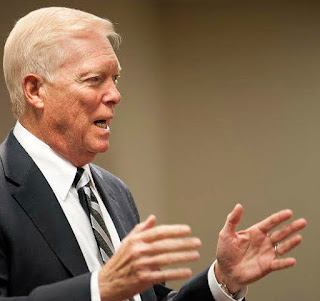I have heard a number of speakers of national import live
and in person—Condi Rice, George W. Bush, Mitt Romney, Austan Goolsbee, writers
Walter Isaacson and Gordon Wood and several Nobel Prize winners. A few months removed from their remarks and I
rarely was able to recall much of anything that was said. Their remarks are
often as bland as dry toast, cliché filled, and unremarkable (although Goolsbee
can be witty).
But one surprisingly did.
I never cared much for former Congressman Dick Gephardt while he was in
office, but his speaking engagement a number of years ago was surprisingly
good. Among the points he made, one
stuck with me. He said that it was his
view that what separated America from most of the rest of the world was that
the losers accepted the results of elections.
They may not like it, but they accept the outcome. He went through example after example of
other countries where that is not the case.
But it was always the case here, even in the most bitterly contested
election.
Sadly, that is no longer the case here. Within hours of Donald Trump’s unexpected
victory in 2016, the Democrats were accusing Trump of colluding with the
Russians, cheating Hillary out of her pre-ordained coronation. Hillary had barely conceded when cries for
impeachment went out. And two years on,
we have an independent investigator still trying to come up with enough
evidence to remove Trump from office.
Alternatively, the Democrats were complaining that the electoral college
was outmoded and needed to be done away with (although no serious effort has
been under way to change that). The
upshot is that nearly half the country still has not accepted the legitimacy of
Trump’s presidency.
Likewise, several of the midterm elections in the South were
challenged. Stacey Abramson, in her
failed bid for Georgia governor refused to concede and then filed suit. Radical socialist Andrew Gillum likewise was
reluctant to let go, even after the Broward County election commissioner Brenda
Snipes magically “found” ballots and Hillary Clinton’s legal team was
dispatched to sway the election.
These are very troubling developments for our republic,
especially the attempted overturning of the 2016 presidential election by
Robert Mueller. Accepting the results,
vowing to run a better campaign next time has been replaced by challenge the
legitimacy, change the rules and do more recounts until you get the result you
want.
The nonacceptance of the results of elections is troubling
enough, but it has been coupled with the demonization of the other side, along
with violent expressions and images.
And the demonization is not limited simply to the other candidate, but
to all that voted for him or her. It
began with Barack Obama’s comment about people who “bitterly cling to their
guns and religion,” and continued with Hillary Clinton’s disparaging “basket of
deplorables.” The demonization of
politicians is nothing new, but what is new is the demonization of entire
groups of people. Just last week, Barack
Obama said that America doesn’t embrace
his energy policies because “we are still confused, blind, shrouded with hate,
anger, racism, mommy issues. You know,
we are fraught with stuff.” The New York
Times hired Sarah Jeong as a senior editor despite her long and documented
antipathy toward white men documented in her Twitter posts.
What is most worrisome is the acceptance by our society of
violent words and images. That comes
mostly from the entertainment crowd but is starting to be used by politicians
as well. From Kathy Griffin holding up
the bloodied head of Donald Trump to Peter Fonda wishing that Baron Trump would
be put in a cage with pedophiles to Bette Midler’s recent tweet that she hoped
the Mueller team would hang ‘em high,
violent words and imagery have become commonplace in the entertainment
world. But it is going further. Maxine Waters who openly incited people to
chase down and harass anyone employed by the Trump administration and in
Illinois, Democratic representative Stephanie Kifowit said she wanted to pump a
lethal broth of Legionella into the home of a political opponent. Democratic representative Eric Stalwell
suggested nuking gun advocates. So now
we have U.S. politicians talking of using WMD’s against their own countrymen
that disagree with them. Even if
hyperbolic, this is a troubling development.
Our divisions are deep and it is difficult to
discern whether they are so deep that “this time is different.” The failure to accept election outcomes, the
demonization not only of political opponents but of entire groups of people and
the lack of inhibition about using violent words and imagery suggest that it is
a legitimate thing to worry about.

No comments:
Post a Comment